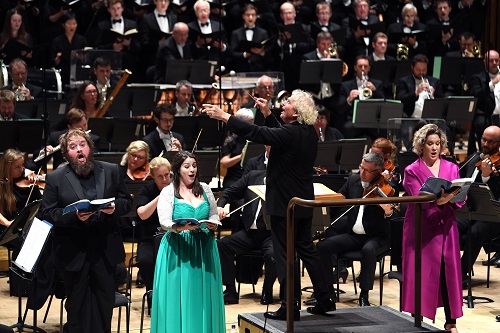 United Kingdom Birtwistle, Holst, Turnage, Britten: Elizabeth Watts (soprano), Alice Coote (mezzo-soprano), Allan Clayton (tenor), Philip Cobb, Gábor Tarkövi (trumpets), Tiffin Boys’ Choir, Tiffin Children’s Chorus, Tiffin Girls’ School Choir, London Symphony Chorus and Orchestra / Sir Simon Rattle (conductor), Barbican Hall, 16.9.2018. (CC)
United Kingdom Birtwistle, Holst, Turnage, Britten: Elizabeth Watts (soprano), Alice Coote (mezzo-soprano), Allan Clayton (tenor), Philip Cobb, Gábor Tarkövi (trumpets), Tiffin Boys’ Choir, Tiffin Children’s Chorus, Tiffin Girls’ School Choir, London Symphony Chorus and Orchestra / Sir Simon Rattle (conductor), Barbican Hall, 16.9.2018. (CC)

(c) Doug Peters/PA Wire
Birtwistle – Donum Simoni MMXVIII (2018, world premiere)
Holst – Egdon Heath (1927)
Turnage – Dispelling the Fears (1994/5)
Britten – Spring Symphony (1948/9)
Sir Simon Rattle intends to open each of his seasons with the LSO with an all-English concert. The contrast of the somewhat familiar (neither the Holst nor the Britten pieces are amongst their best known), the contemporary (Turnage) and the ink-still-wet (the Birtwistle) made for terrific programming for this lavish event. Both living composers were present, as one might expect at such a high-profile evening.
First, the Birtwistle fanfare, Donum Simoni MMXVIII (Simon’s Gift 2018) performed with brass to one side, horns standing. Those chthonic, rumbly Birtwistle openings found another to join the club with three percussionists adding a ritualistic feel. Frozen woodwind chords injected stillness while the sound of bells invoked an ancient ritual. All of the core Birtwistle ingredients, then, in microcosm, stunningly played by one of the world’s great brass sections.
In a spoken introduction, Rattle spoke of Sir Adrian Boult’s thoughts on Egdon Heath, a piece by Holst inspired by an imaginary space in Thomas Hardy’s The Return of the Native: Boult thought it a masterpiece and encouraged the young Simon (no Sir, then) to champion the score. Sound advice, it turns out, as this is one of Holst’s finest scores. It is elusive, though, as well as decidedly brooding. Superbly even double-basses in this performance led to simply radiant pianissimo strings. Warm trombones and the creamiest of clarinets added to the individual palette, so lovingly revealed by Rattle. The piece is actually subtitled ‘A homage to Thomas Hardy’, and there was no missing the atmosphere invoked here. If there was one highlight of the night, this was it.
Mark-Anthony Turnage’s Dispelling the Fears is one of several pieces from this composer that feature the trumpet (think Wreckage, 2004, or Håkan of 2015). This is a composer, like Birtwistle, that Rattle has long been associated with, and there was an assured feel to the trajectory of the performance. The two trumpeters, the LSO’s Philip Cobb and the Berlin Philharmoniker’s Gábor Tarkövi, paragons of technical excellence both, shone. This is a deeper piece that a mere display vehicle, though, and while one might delight in such moments as a timbral canon (one trumpet open, the other muted), it was the sense of compositional rigour and coherence that really impressed. Turnage’s harmonies hold so much tension within them, only finding release in a brief flash of Romantic gesture from one of the soloists at the climax. Two trumpeters speaking precisely the same language and aided by a glowing orchestra seemed to show the piece in the best possible light; and yet the deliberately uncomfortable low woodwind sonorities of the opening held huge power.
Britten’s Spring Symphony is the stuff of special occasions, with its multiple choruses and large orchestra. The children were deployed at various points around the stage, as well as in front of the stage in the stalls and up one of the stalls aisles; the Cow Horn (Christopher Larkin) was positioned in the balcony. Britten sets a large variety of poets – 23 poems spread between four parts, from our old friend Anonymous through the metaphysical poets through to William Blake. It is a remarkable work, unseasonal as in clock time Summer now morphs into Autumn, but magnificent in scope, and, indeed, inspiration (t was commissioned by Koussevitzky). The work was premiered in 1949 in Amsterdam conducted by Eduard van Beinum.
Rattle chose his soloists with care. Alice Coote’s fruity, full sound was perfect for this music, while Elizabeth Watts’ glowing soprano brought a sense of ecstasy to the experience. Allan Clayton is an emerging tenor of simply huge talent his voice powerful but always with a heart of lyricism that perfectly suited Britten’s lines. His diction was superb, and he can float a line as convincingly as he can declaim one. Coote revelled in the charming gentilité of ‘Out of the Lawn’. Th apt choice of soloists was most clearly revealed, though, in the ‘Fair and Fair’ setting, Watts and Clayton’s joyous rendering a celebration of the voice itself.
The choir, as is to be expected from the London Symphony Chorus, was characteristically excellent. The idea to have them sway in quasi-drunken revelry in the final portion of the work, despite the text’s description of a celebration, was one of those things that I’m sure seemed a good idea at the time. Far more compelling was the children’s counterpoint of ‘Sumer is icumen in’ towards the close. Rattle paced the work so that it became more than the sum of its parts, the LSO 100% behind him. The sheer power of the orchestra-only passages in the first part was utterly remarkable; the piece deserves championing to this degree, beyond a shadow of a doubt.
One of Rattle’s spoken points was to refer to the sheer variety of the treasure-trove of English music; the concert itself proved more than words ever could just how varied in jewels this trove really is.
Colin Clarke